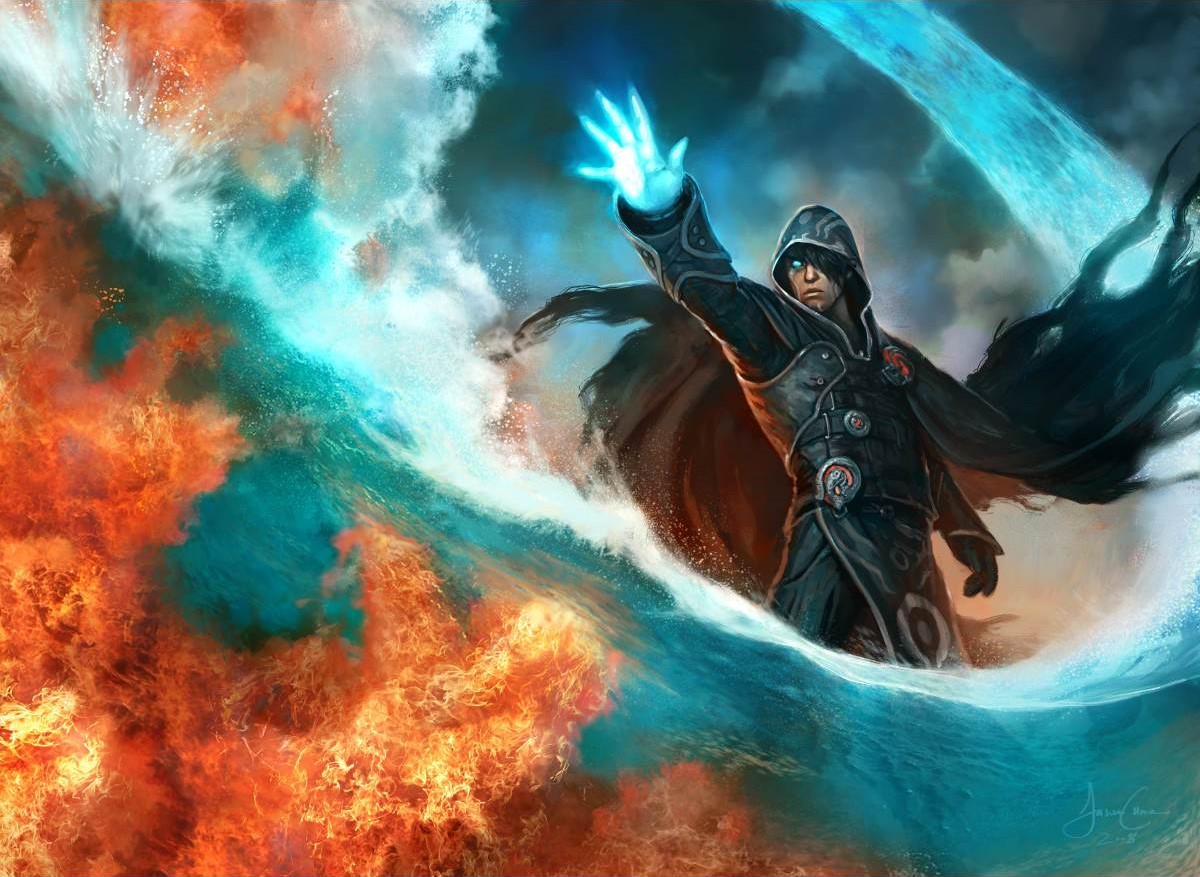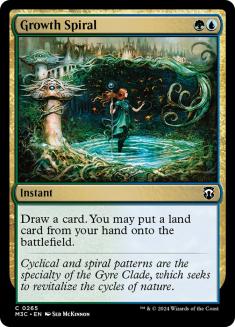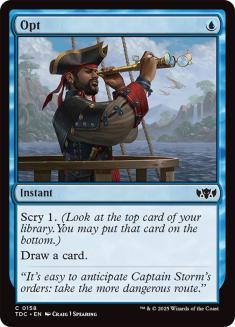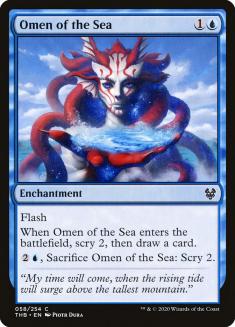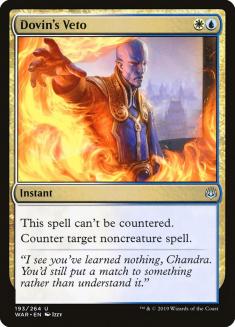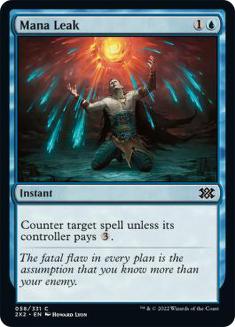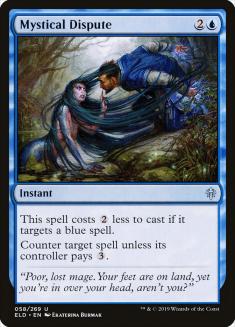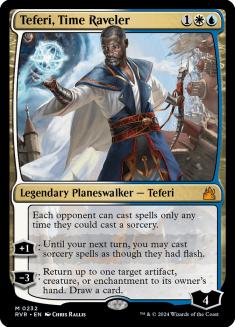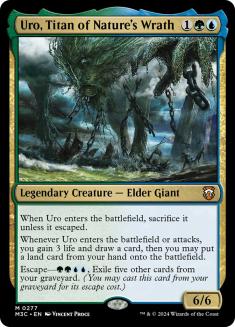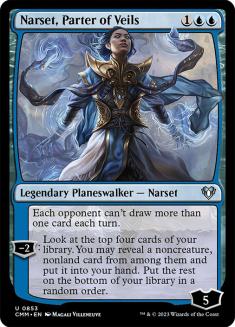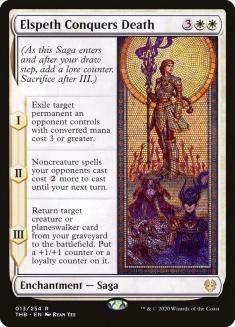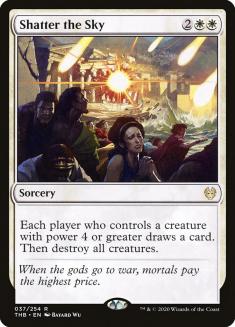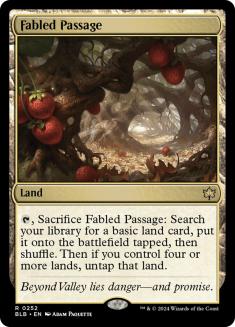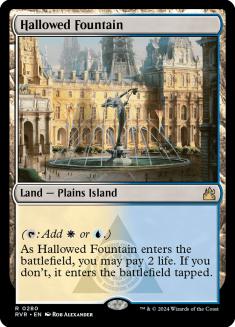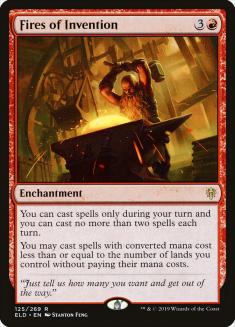Most of the time, it’s painfully obvious if a card should be countered or not. You’re usually not letting Teferi, Time Raveler; Niv-Mizzet Reborn; or Agent of Treachery resolve if you can help it. The difficulty arrives when we deal with cards that aren’t these haymakers, but rather the supporting cast that makes it easier to find or to cast them.
Every time your opponent plays one of these cards, you’re presented with a choice — should you counter it or should you try to save the counterspell for the card that actually matters in the end?
In today’s article, I’ll talk about general concepts that can make this decision go one way or the other, and then give you a list of how I believe the popular counterspells should generally be used against the popular “set-up” spells in Ikoria Standard.
When deciding to counter or not counter an enabler, I usually ask myself three questions.
1. If I don’t use my counterspell on this set-up card, can I use it to counter the important card later on?
Sometimes, it’s easy to know if you can counter the reward or not by just looking at the nature of your counterspell and what the reward is. Some of them have limitations (Negate, Dovin’s Veto), so if the payoff card is a creature, you’ll be unable to counter it. Some of them have expiration dates (Mana Leak), so whether they will work or not will depend on how much the important card costs and when it’s going to come down. Mystical Dispute, for example, has both a limitation (it wants to counter a blue spell most of the time) and an expiration date, which means it’s the most likely of the counterspells to be used on a set-up card.
You might also be unable to counter the important card because of how you envision the game will play out. For example, you could look at your hand and realize that, for the next three turns of the game, you’ll be tapping out, which means you will be unable to counter anything your opponent casts, at which point you might as well counter that Omen of the Sea. Alternatively, you might believe your opponent has their own counterspell, and if you wait for the important card, they will be able to fight you for it, which means you need to stop them from finding it to begin with.
Finally, it’s possible you simply will not be able to counter the important card because the card is literally uncounterable — a land, for example. Imagine your Temur Reclamation opponent passed Turn 3 without playing a land; then, on Turn 4, they draw a card and cast a main-phase Opt. Clearly in this spot they drew the Opt and they’re looking for land, so you can’t actually counter what matters, which means you should consider countering the Opt. Similarly, a different situation might have an opponent using Omen of the Sea to dig for Dovin’s Veto, which you also can’t counter, so if you want to stop that, your only option is countering the Omen of the Sea.
2. If you counter this spell, what can punish you?
Sometimes, a card is so important that you simply cannot afford to have it resolve, so you need to let go of whatever set-up card you’re considering countering because the danger is too high. This is usually the case with Teferi, Time Raveler, which completely warps the game in many blue matchups.
For example, imagine a scenario where your opponent is playing Yorion Bant Ramp and you’re playing Yorion Azorius Control, on the draw. Your opponent then casts a Growth Spiral at the end of Turn 2, and you have a Mystical Dispute in your hand. Normally you would like to counter Growth Spiral with Mystical Dispute — that’s a good use of the card — but, if you do that, they can untap and cast Teferi, Time Raveler, and this could have disastrous consequences for the remainder of the game, so you’re forced to let the Growth Spiral resolve because the threat of the Teferi is too big.
3. If you don’t counter this spell, what can you do instead?
Having another use for the mana (such as casting Nightpack Ambusher, casting Omen of the Sea, or even cycling a Triome) should make you more likely to let a spell resolve. When you leave mana up for a counterspell and have nothing else to do with it, then you’ve already paid for the counterspell this turn, and casting it is essentially free. It doesn’t mean you have to be trigger-happy about it and counter anything your opponent plays, but it does increase the odds that you should use your counterspell.
Now, let’s examine the most common set-up spells in Ikoria Standard and how you should generally react to them with the three most commonly played counterspells: Mystical Dispute, Dovin’s Veto / Negate, and Neutralize / Absorb.
Opt
Opt is the simplest form of interaction that you can actually counter, and you will almost never do that — most of the time, it’s better to just save your counterspell for the card that actually matters. The standard situation where you would consider countering Opt is when what matters is actually uncounterable, such as the Temur Reclamation player clearly digging for a land to play in their own turn.
Should you counter Opt with Mystical Dispute?
Rarely. Outside of the aforementioned situation, this can come up in a spot where Mystical Dispute will soon become (or already is) irrelevant and an opportunity to counter an Opt presents itself. For example, imagine your Temur Reclamation player has nine lands on the battlefield. At the end of your turn, they’re tapped out and end up playing an Opt. You should probably counter it, because Mystical Dispute won’t be countering anything else.
Should you counter Opt with Dovin’s Veto?
Almost never.
Should you counter Opt with Neutralize?
Almost never.
Growth Spiral
Growth Spiral’s value changes dramatically depending on which phase of the game it is — a Turn 2 Growth Spiral is simply a much better card than a Turn 10 Growth Spiral, and you should react to it accordingly.
Should you counter Growth Spiral with Mystical Dispute?
Almost always. Growth Spiral just does too much early on, and part of what it does is make Mystical Dispute obsolete sooner. When you’re playing against Temur Reclamation, it’s more clear that you should counter the Growth Spiral since their follow-up can dodge Mystical Dispute if you only have two lands on the battlefield, but I believe you should do it against almost every deck.
Should you counter Growth Spiral with Dovin’s Veto?
Almost never. Decks that play Growth Spiral are usually non-creature-based, which means Dovin’s Veto becomes a premium card and the limitation isn’t actually a thing. A Turn 2 Growth Spiral is a powerful card, but not worth using Dovin’s Veto on.
Should you counter Growth Spiral with Neutralize?
Almost never. Due to the nature of the card Growth Spiral, it’s usually not nearly as relevant by the time you even have a chance to counter it with Neutralize.
Omen of the Sea
Omen of the Sea is basically a powered-up Opt, and you would treat it similarly if not for Yorion, Sky Nomad. The fact that Yorion can blink Omen of the Sea turns it into a legitimately powerful spell, and whether I counter it or not is usually contingent on my ability to stop a follow-up Yorion.
Should you counter Omen of the Sea with Mystical Dispute?
Sometimes. Since Mystical Dispute can counter Yorion as well, the most important question here is, “What can they resolve instead?” If they’re not threatening anything important the following turn, then I will usually counter it, but if the potential exists for them to untap and cast a powerful card, then almost anything that they can cast will be more important than the Omen. For example, if I have two mana up and two Mystical Disputes in hand, I will usually counter the Omen because I also have a counterspell for the follow-up Teferi, but if I only have one, then I won’t.
Should you counter Omen of the Sea with Dovin’s Veto?
Rarely. I actually counter Omen of the Sea with Dovin’s Veto more than I do Growth Spiral because of Yorion, but it’s still not enough to give it a “sometimes.” If I have a single way of stopping Yorion in my hand, I will never Dovin’s Veto the Omen of the Sea. If Yorion is just going to resolve for sure, I might do it. The key is that, even if you have no ways of dealing with Yorion, they don’t know that, and are usually not going to jam it into open mana (whereas casting Veto on the Omen is almost a sign that the coast is clear for them to cast their creature). If they knew my hand, I would counter the Omen with the Veto much more often.
Should you counter Omen of the Sea with Neutralize?
Almost never, given that Neutralize will always be able to stop the Yorion itself.
Uro, Titan of Nature’s Wrath
Uro is the same as Growth Spiral (the three life is irrelevant in these matchups most of the time), with two key differences. The first is that it’s never on Turn 2 — as before, a Turn 2 Growth Spiral is exponentially more powerful than a Growth Spiral on any other turn, and Uro can never be that, which means you’re less likely to counter it. The second difference is that it’s always sorcery-speed, which means you cannot be punished by countering it. As a general rule, though, I’ll say that I counter a Growth Spiral more than I counter Uro.
Should you counter Uro, Titan of Nature’s Wrath with Mystical Dispute?
Sometimes. I most often find myself countering Uro when it will let me force through a spell of my own the following turn. For example, imagine you’re on the draw, it’s your opponent’s Turn 3 (so you have two lands on the battlefield) and they cast Uro. Your hand is:
In this spot, if you counter Uro, you’re guaranteed to land Narset, Parter of Veils. If you don’t, they can play an untapped blue source and then Mystical Dispute your Narset, and you cannot fight back because you’ll only have three lands on the battlefield, so I would counter the Uro and stop that sequence from being a possibility.
Should you counter Uro, Titan of Nature’s Wrath with Dovin’s Veto?
No. That’s cheating.
Should you counter Uro, Titan of Nature’s Wrath with Neutralize?
Almost never (the first time, of course — sometimes the second time).
Narset, Parter of Veils
Narset is a tricky card to evaluate because it’s usually two cards in one — a digging spell and the passive effect. If the passive effect is bothersome to you, you will almost always counter it no matter what. If you can maneuver around the effect, it’s a more interesting question.
A lot of the time, if I can kill Narset immediately (such as, for example, with a Shark token from Shark Typhoon), I will let it resolve because the Impulse just isn’t worth my counterspell. So, for me, the general rule with Narset is that if it’s going to get one activation, I will not counter it, but if I expect it to live to activate a second time, I will almost always counter it.
Should you counter Narset, Parter of Veils with Mystical Dispute?
Almost always. This is because, most of the time, if you have the chance to counter Narset with Dispute, it’s unlikely to be late enough in the game that you can kill it outright. The exception here is when you have five lands and Shark Typhoon and they cast Narset with only two mana up. Here, even though you could Mystical Dispute it, I find that making the Shark and killing it is often the better play (though there’s an exception to the exception if they have a bunch of Brazen Borrower).
Should you counter Narset, Parter of Veils with Dovin’s Veto?
Sometimes. Early in the game, I almost always do (since it’s almost guaranteed to activate twice). But if it’s late in the game and I’m winning it, I often let it resolve.
Should you counter Narset, Parter of Veils with Neutralize?
Sometimes. This is the exact same with Dovin’s Veto.
Fires of Invention
Fires of Invention also changes wildly in power level depending on which turn of the game it is. If it’s Turn 4, you’ll do anything in your power to stop it from resolving — the advantage it provides is too big, since you’re usually limited to casting one counterspell a turn at that point in the game and they can just overpower you if it resolves. If it’s later in the game, you could let it resolve because it doesn’t actually do anything on its own. Besides, if it’s early in the game, you know casting Fires eats up their whole turn, whereas later on if you counter it they could just follow it up with a threat and then that’s very bad for you.
Should you counter Fires of Invention with Mystical Dispute?
Almost always. If they resolve Fires of Invention, chances are you will never be able to use Mystical Dispute again.
Should you counter Fires of Invention with Dovin’s Veto?
Almost always, unless it’s super-late in the game. If you don’t counter Fires, they could immediately follow it up with a creature and you can’t counter that with Veto (though obviously it’s dependent on how much mana they have and what you think they can play). If you have other answers to a creature (for example you have both a Veto and a Neutralize in hand), you’re fine letting the Fires resolve for the most part.
If you have both Dispute and Veto in hand, you usually want to counter it too, especially if they have seven mana, because the Dispute will be an answer to Agent of Treachery for the foreseeable future that will be immediately blanked by the Fires (and if they follow it up with a Teferi or Narset you can Dispute it).
Should you counter Fires of Invention with Neutralize?
Sometimes. Early in the game you should always do it, later in the game it depends on how many cards they have in hand and how much mana they have access to.
The “Should You Counter X With Y?” Chart

To illustrate these concepts, I selected two interesting plays that came up in the MagicFest Online Season 2 Finals and that might have a little more about them than meets the eye.
Situation 1:
This is a match against Ivan Floch, in the Top 8 of the MagicFest Online Season 2 Finals. Ivan is on the play, leads with Castle Vantress, and then follows it up with an untapped Stomping Ground. I play Temple into Temple. At the end of my turn, he casts Growth Spiral. Should I counter it?

There are two things at play here. The first is that, if I don’t counter the Growth Spiral, I will be unable to counter a Wilderness Reclamation follow-up. This means I should almost definitely counter the Growth Spiral.
The second thing, however, is that I’m playing versus Ivan Floch. Ivan is a world-class player who surely knows to cast main-phase Growth Spiral if he doesn’t want it to get hit by Mystical Dispute (I was, after all, tapped out, and I could not punish him with a planeswalker given that I was on the draw).
Furthermore, his choice of lands indicates to me that his hand is land-light. If Ivan had a blue Temple, Triome, Steam Vents or Breeding Pool, he would have played those on Turn 1 over Castle Vantress. If he had Forest, he would have played that on Turn 2 instead of Stomping Grounds. There aren’t many lands Ivan could have that would not have been on the battlefield already unless he drew them this turn specifically. If Ivan had just drawn a Temple or Triome, however, I imagine he would almost certainly have main-phased the Growth Spiral, as it’s potentially a two-turn swing to have it countered.
So, we can conclude that there’s a reasonable chance Ivan doesn’t even have a third land to play if Growth Spiral resolves. Furthermore, it is likely he does not have Wilderness Reclamation in hand (or any four-mana card for that matter). If he did, casting the Growth Spiral would have been too appealing — he can always hit a Temple and then scry into his fourth land, and casting a Turn 3 Reclamation when I can’t Dispute it is his best way of winning the game, so we should construct his hand in a way where this is not a possible sequence, given that he didn’t go for it, and that hand necessarily does not have Wilderness Reclamation.
In Magic, there’s a maxim that, if your opponent is good, you don’t let them make the choice for you. Ivan could have guaranteed that Growth Spiral resolved by casting it in his main phase; instead, he decided to give me the choice to counter it or not. Therefore, it follows logically that his preference is that I spend the Mystical Dispute on the Growth Spiral — he wants this trade, given that he offered it. Therefore, it follows logically I should not do that.
Yet, I countered the Growth Spiral. I believed that, even if Ivan did actually have no lands and no Reclamation, it was still a worthwhile use of the card for how far back it could set him if his top card was a land that entered the battlefield tapped. If he has no Reclamation in hand, I don’t need to save the Dispute for anything anyway, and if he does have it (or draws it) then I’ll be glad I countered the Spiral. I’m not entirely sure I was correct in countering it, though.
In the end, the maxim about choice is true, but you can “overrule” it if you feel you have better information (or if you feel that they’ve made a mistake), which I chose to do in this case. For the record, if I did not know the player was very good, I would have countered it without a second thought.
Situation 2:
This was against Seth Manfield in the same tournament. He was playing Temur Reclamation with two Brazen Borrowers. I was not fast enough with the screenshot so you have a spoiler from my play, but the decision here is still interesting.

In this spot, Seth is responding to my Teferi with Growth Spiral, with Fabled Passage up. Should I counter it?
Countering Growth Spiral ensures that Teferi resolves, which is obviously a winning proposition, but you could argue for a different play because Seth has Brazen Borrower in his deck. If I counter the Growth Spiral and Seth just untaps and bounces the Teferi, I know that I will not recast it immediately (which is what happened in the match). If I let Growth Spiral resolve, I have the Dispute left and know that I will be able to immediately recast Teferi.
In the end, I chose to counter it anyway because I thought a reasonably likely development was that Seth would play a land from Growth Spiral, use his Fabled Passage, and then fight Teferi with either Dispute or Negate. If he does that, I will Dispute back and guarantee that Teferi resolves, but at this point I am trading for a card that will be virtually useless once Teferi resolves. There’s a chance that, if Seth doesn’t cast his counterspell now, he will not be able to cast it for the remainder of the game. There’s also the small chance that Seth has two Mystical Disputes in hand (not likely, given he’s already cast one, but possible) and in this case allowing the Growth Spiral to resolve is disastrous because it gives Seth two mana. In the end, I felt it was better to counter the Growth Spiral with the Dispute now and to “virtually” counter the Negate and Dispute with the Teferi.
In the end, every situation is different. It’s not trivial to know if you should counter these spells or not, and if you could just follow a cheat-sheet to the dot, then Magic wouldn’t be very interesting. I’ve given you enough of the thought process behind the decisions that, when the time comes for you to counter that Growth Spiral, you’ll be able to identify it with confidence.

